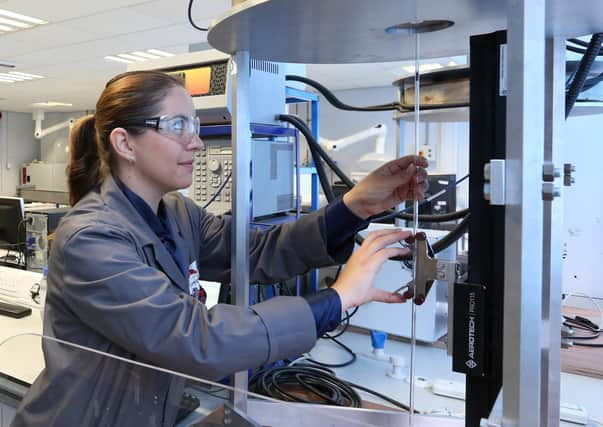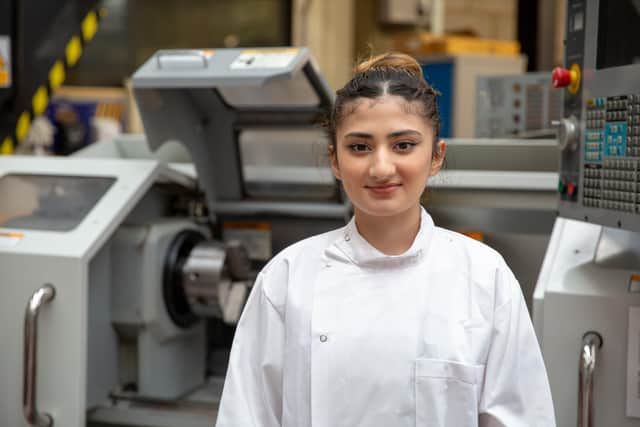The women from Yorkshire changing the way we live


Paula Palade is affectionately known as Jaguar Land Rover’s ‘professor in residence’. She holds two degrees – one in electrical engineering and another in computer science – together with a PhD in electrical engineering and is now working with the University of Bradford to encourage more women into engineering.
She is one of a number of speakers taking part in a University of Bradford event to mark International Women In Engineering Day tomorrow.
Advertisement
Hide AdAdvertisement
Hide AdRecently appointed an Honorary Visiting Research Fellow at the University, she won an Autocar Great British Women in the Car Industry award in 2019, and now works as human resources (HR) Digital Manager at Jaguar Land Rover.


“Being an engineer opens so many doors in so many fields, it’s no longer just about a man in a hard hat on a building site. If you have creative skills, enjoy identifying solutions to problems, and seizing the opportunity to be innovative, there are so many interesting jobs you can do,” she says.
“During my career, I’ve worked as an academic, a researcher, an electrical engineer and now I’m in HR, so that shows you the diverse range of career options available to people with this skill set.
“This is an interesting time to be in the automotive industry, as there are a lot of challenges and changes taking place. Jaguar Land Rover is very forward-looking and it’s a wonderfully liberating environment to be in and one I would recommend to others.”
Advertisement
Hide AdAdvertisement
Hide AdPaula grew up in Romania and was inspired to explore a career in engineering by her parents and grandparents, describing them as ‘an engineering family’. During her career, she has worked as a lecturer, researcher, an engineer, electrical engineer and is now HR Digital Manager, working on introducing more customer-based human resource strategies to the workforce.
She has worked for some of the world’s biggest companies, including mining group Rio Tinto, where she designed and built huge microwave processors used to extract things like copper ore more efficiently, while also wrestling with the challenge of embedding ethics into self-driving cars. In September 2020, she contributed to a report to the EU Commission entitled New Recommendations for a Safe and Ethical Transition towards Driverless Mobility, which examines the ethics of driverless cars.
“Where cars differ from other types of tech which involves AI is that in a car you put your loved ones and so you want to ensure that the car behaves properly, is robust, reliant, and also that it behaves ethically.
“We all have our own ethics on the road. It could be that you push your way into a roundabout or budge your way into a queue – those behaviours are not illegal but there is a question about ethics there.
Advertisement
Hide AdAdvertisement
Hide Ad“So, is it ethical to break the speed limit or mount the kerb to allow an emergency vehicle to pass? As people, we all make these decisions but we need to ensure the driverless cars of the future have an ethical framework to underpin such decisions. Part of this process is also about ensuring these ethical considerations are embedded in such projects at the development stage.
“This may also extend to things like ensuring driverless cars give pedestrians and cyclists more room. Vehicles of the future will have a moral compass that we all have a responsibility to create, so they can make these decisions.”
Second-year Mechanical Engineering student Sumaiya Khan also comes from a family of engineers.
“My cousin is a mechanical engineer and she currently works in the renewable energy sector. Watching her graduate as a mechanical engineer inspired me to do the same. My career goal is to work in the green energy field. I want to do my part by inspiring young women to become mechanical engineers or go into another STEM [science, technology, engineering, maths] career,” says Sumaiya
Advertisement
Hide AdAdvertisement
Hide Ad“People usually say I don’t look like a mechanical engineer but that’s because typically they are men and that needs to change. Diversity is important because different backgrounds, gender, culture and race brings different perspectives on the project and the benefit of that is it can cater to a wider range of society. Women are just as capable at engineering as men.”
Manja Ehmke is a second-year biomedical engineering student, learning about a wide range of subjects including stem cell research, artificial tissue engineering, prosthetics, MRI machines and more. Originally from Germany, she came to Bradford with the intention of studying forensic archaeology but was lured by the possibilities offered by biomedical engineering.
“For me, the subject offers the chance to make a big difference, not just to one person but potentially millions, in terms of things like stem cell research and artificial organs. I’ve always been interested in science and there are a lot more women taking up these subjects today, so I would encourage anyone at school who is interested in science to pursue this career – it holds so many possibilities, both in terms of research and career prospects.”
The event takes pace at the University of Bradford on Wednesday June 23 from 10am to 11am to celebrate International Women in Engineering Day 2021.
Comment Guidelines
National World encourages reader discussion on our stories. User feedback, insights and back-and-forth exchanges add a rich layer of context to reporting. Please review our Community Guidelines before commenting.